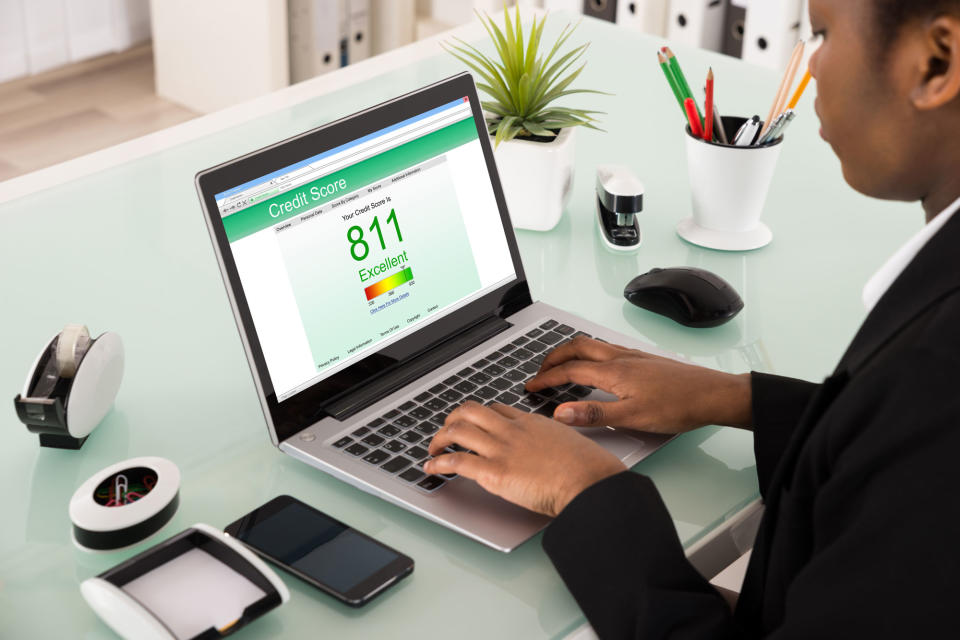Credit score apps can be handy—but there's a catch

Of all the financial-related apps and services out there, there’s a proliferation of new ones that claim to let you check your credit score for free, without affecting your credit.
A credit score is essentially your financial report card; the higher the score, the better. Financial institutions scrutinize your credit history and score to determine how much money to lend you (if any at all) or how big a mortgage you qualify for.
Keeping track of your credit score is extremely important, financial experts say. So is knowing exactly what kind of information these service providers are giving you.
Mogo, which offers loans, mortgages, and other financial products, was the first to come out with free credit scores for Canadians. Your score is updated monthly in the dashboard with a graph and tips on how to improve it.
Borrowell, an online lender, debuted not long after Mogo. It updates the score every three months.
Credit Karma offers weekly score updates as well as your full report—not just the score itself.
Rate Hub, a loan-comparison site, is another player. It refreshes your score periodically along with tips on how to improve it.
Some banks also let you check: RBC and CIBC are two that offer their clients free credit scores.
Financial literacy educator Chantel Chapman, founder of Holler for your Dollar, welcomes the services. Not only do lenders use credit scores to make sure you’re credit-worthy, she notes, but employers, landlords, insurance companies, and others look at them as well. Plus, checking your score regularly is one way to detect fraud or identity theft.
Before all of these services came along, people would get their credit score themselves via Equifax or TransUnion. Both will send it to you for free by mail once a year. (You can also purchase your score and credit report online.) Like free scores offered by the aforementioned companies, these are called “soft checks” and do not impact your score.
More than one score
Not all scores are created equal, Chapman notes.
“I worked as a mortgage broker for over 10 years, and it was very common for customers to tell me their score that they got personally from Equifax or TransUnion was higher than what I was seeing when I was doing the credit check for their mortgage,” Chapman says. “The reason for this is that Equifax and TransUnion have multiple score products that they sell.”
Here’s where things get complicated: Using Equifax as an example, there is “ERS 1,” which is the score that consumers get when they buy the report from Equifax directly.
“Equifax says right on the site that this score is for educational purposes only,” Chapman says. “This score is an older score version and is not being used by all lenders. There is a score called ERS2, which is used more commonly by lenders as it is the newer score version. Borrowell, CIBC, Rate Hub and Mogo offer the ERS2 score.
“Another score which mortgage lenders use when deciding if a customer is credit worthy is Beacon 9, but this score is currently not available with the free score services.”
Why it’s free
While the services won’t cost you anything, there is, of course, a catch. By knowing your score, financial companies and their partners can hit you with sales pitches. You know how ads based on your search history appear on Facebook? It’s the same idea here.
“You share your contact information, and in some cases credit report data, and they [the credit-score companies] share the score,” Chapman says. “This shared information provided by you is valuable for these companies as it allows them to create custom offers for you.”
Credit scores are determined on an algorithm that’s made up of different aspects of your credit history: payment history (35 per cent), utilization ratio (30 per cent), length of credit (15 per cent), types of credit (10 per cent), and inquiries (10 per cent).
Two key factors that affect your credit are skipping payments and your utilization ratio—how much of your debt you have used.
Ways to build a strong score are to make sure you pay all of your bills on time and have a balanced mix of credit products, low usage of credit, and no outstanding collections or bankruptcy.

 Yahoo Finance
Yahoo Finance 
